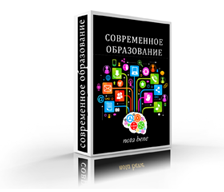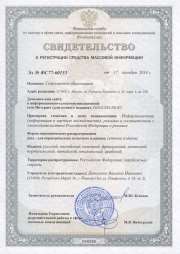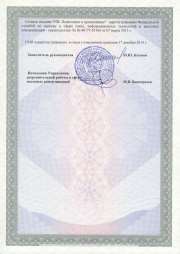MAIN PAGE
> Journal "Modern Education"
> Rubric "Philosophy and pedagogy"
|
Gryaznova E.V., Goncharuk A. - Formation of methodological culture of a young scholar at the lectures and practice in the university
|
|
pp. 9-18
|
DOI: 10.25136/2409-8736.2018.2.26062
Abstract: The goal of this work is demonstration of the possibilities of implementation of the pedagogical principles and methods in formation of methodological culture of a young scholar at the lectures and practice, tested in the course of multiyear work with the indicated set of students. As an example, the author selected the topic “Definition of the concept of science”, because it is included to multiple disciplines of masters and postgraduate programs in various aspects. Special attention is given to the problem of creation of the integral theoretical, methodological and practical foundations of educational courses based on the example of the disciplines “Philosophy of Science” and “Methodology of Scientific Activity”. The key methods of research contain the analytical overview of scientific culture, analysis, generalization, classification, principles of didactics, individual approach to a student in terms of the collective work, systematicity and sequence, stability in knowledge and skills, correlation of theory and practice. The listed pedagogical methods can be implemented in practice by the educators in creation of the learning courses for magistrates and postgraduates. In particular, they make the lecture material more interesting and relevant, help the students to create a holistic understanding of the goals and tasks of the studied subject, as well as the practical importance of the acquired theoretical knowledge. Inclusion of the elements of methodology of scientific knowledge into theoretical material conduces the more efficient achievement of one of the major goals of education – attainment of methodological culture by young scholars.

|
Voronichev O.E., Voronicheva O.V. - Problems of education: fiction and reality
|
|
pp. 21-29
|
DOI: 10.25136/2409-8736.2022.3.34523
EDN: KWQXTI
Abstract: The problems of education are analyzed in close relationship with the cultural priorities of the mass consumption society.. Attention is focused on the fact that a teacher should not just be a translator of knowledge, but first of all a spiritual mentor, educator, bearer of true cultural values. Rapid scientific progress, the result of which has been noticeable, especially in recent decades, the filling of the everyday and cultural space of society with various technical innovations, has clearly actualized the problem of interaction, correlation and significance of technogenic and humanitarian components in the life of man and society. The sphere of education has turned out to be at the forefront of the confrontation of these spheres, with the obvious and aggressive dominance of the first. Signs of the crisis of modern humanitarian education are considered in the mirror of R. Young's science fiction story "30 Days in September", which describes the quite probable and already tangible consequences of the choice of a technogenic path of development by society for culture in general and the educational sphere in particular. Since material benefits are achieved and accumulated much more easily than spiritual ones, humanity needs to think about the obvious imbalance of these components of our life today and build an education system in such a way that the priority is not the desire for unified material benefits inherent in a mass consumption society, but for genuine spiritual values necessary for the development and improvement of a person as a whole personalities.

|
Kozlova T.A., Ryzhakova E.V. - Formation of anthropological consciousness of future teachers as a factor of humanization in the postmodern era
|
|
pp. 31-38
|
DOI: 10.25136/2409-8736.2022.2.34507
EDN: YIYXSA
Abstract: The subject of this article is the conditions for the formation of the anthropological consciousness of the future teacher. By anthropological consciousness we mean a form of reflection of the surrounding world, aimed at preserving human nature in the conditions of transhumanism. The relevance of this topic is due to the trends inherent in the modern socio-cultural situation. Modern education is developing in conflict with the trends of transhumanism and postmodernity. Therefore, it is education that pushes a person to try to realize the extent of using the fruits of scientific and technological progress, to anticipate the possible consequences of the desire to transform and improve their genotype. Education should now be understood and mastered as a special philosophical and anthropological category, fixing the formation of the human in man.The mission of a teacher in the modern multicultural world is to help the younger generation to coexist harmoniously in the processes of integration, migration and globalization. The culture of interethnic communication implies a humanistic orientation, education, tolerance. The core that ensures harmonious intercultural communication is universal values. It is extremely important for future teachers to work both with their own axiological attitudes and with the attitudes of their students. Orientation to the hermeneutical-phenomenological tradition, understanding approaches in education, expansion of philosophical training of future teachers contributes to the formation of anthropological consciousness. Thus, the task of modern education is to help a person to understand and adequately interpret their own being in the context of modern socio-cultural phenomena. Therefore, the formation of the anthropological consciousness of future teachers, aimed at preserving the human in man, opposing the negative trends of transhumanism and the era of blurred meanings, is necessary.

|
Khalilov R.A. - The ontological argument as the methodological basis of the considered problem of cosmism
|
|
pp. 39-54
|
DOI: 10.25136/2409-8736.2022.2.35963
EDN: XYWAVS
Abstract: The article is devoted to the content of the theory of cosmism and its conceptual and methodological foundations. The analysis of the content of the works of foreign cosmists and their role in the world, philosophical, cultural and pedagogical science is given. The evolution of mankind has faced many crisis phenomena and negative consequences of their existence. Their impact on the world should be studied not only on the scale of the planet, but also in outer space. The balance between the negative and positive vector of the existence and development of our humanity remains quite fragile, which makes it inevitable to turn to the basic concept of "cosmism". This study reveals the content of the above concept, including the concept of "Russian cosmism", characteristics of the cosmic worldview. The main difference between foreign cosmism and Russian is shown. The concept of "human transformation" in the context of the philosophical and pedagogical direction, the concept of space pedagogy (pedagogy of cosmism, cosmopedagogy), methodological principles of the anthropocosmic concept of education are analyzed in their connection with the modern education system. An important methodological advantage of the pedagogy of cosmism is the consistency of the tasks set, the methodological educational principles included in it. The key and most promising methodological principles of cosmism for the modern education system are identified, which are reflected in cosmopedagogy and are its obvious advantages. The development of the child's cosmic self-consciousness, corresponding to feeling and intuition, must be taken into account in the content of modern education.

|
Maltceva S.M., Grishin V.V., Shilovskaya N.S. - To the question of correlation of the content and form in modern education: philosophical aspect
|
|
pp. 44-49
|
DOI: 10.25136/2409-8736.2019.3.27274
Abstract: The object of this research is the crisis processes in culture and society; while the subject is the attributes, causes and consequences of formalization in modern education through the prism of correlation of the form and content. A dangerous trend is the substitution of conceptual aspect of education with the formal. The authors pursue parallel with the similar processes in the economy. Emphasis is made on the fact that education is not the translation of information. Its meaning consists in formation of a person’s worldview, and the key role in this process belongs not to the computer technologies, but the persona of the teacher. The authors claim on the systemic character of the identified issues and suggest their solution based on the complex and systemic approach. The scientific novelty consists in the thought that in the time of dominance of the technologies and economy, the traditional system of education cannot be fundamentally rejected as untenable. It contains such essential elements as, for example, the institution of mentorship, which forms the creative and spiritually whole person. The conclusion is made on the tendency of modern education towards its formalization: the external form replaces its content and essence. The authors also underline devaluation of education as a result of the all-round crisis of humanity; as well as suggest the method to counteract the emerging dehumanization, consisting in restoration of live communication between the student and the teacher, since virtual communication can never replace it.

|
Gryaznova E.V. - Research methods and Categories of the Philosophy of Science
|
|
pp. 49-68
|
DOI: 10.7256/2306-4188.2014.3.12960
Abstract: In this article the option of creation of the second lecture of the course "History and Philosophy of Science" is offered. Material of the first lecture was published in work earlier: Gryaznova of E.V. The Subject of the Philosophy of Science //NB: Philosophical researches. - 2013. - Issue No. 6. - Pages 514-529. In the presented material the multilevel concept of methodology of scientific knowledge with analysis of examples of use of various methods of scientific research in science philosophy in detail is considered. The special attention is paid to a dialectic method since in modern dissertation researches it ceased to play a key role that reduces quality of the last. Feature of creation of this material is that in the course of a statement it is offered not only to acquaint listeners with the existing methodology of scientific research, but also on concrete examples from their dissertation researches to fulfill possibility of its application. In work laws and the principles of dialectics, the analysis and synthesis, the principles of didactics, elements of interactive pedagogical technologies are used. This material was approved when carrying out occupations with graduate students and undergraduates. Thanks to interactive technologies and to existence of interrelation between the stated material and dissertation researches of listeners, material is acquired purposefully and helps into practice to practice to put the gained knowledge. The presented article can become a methodological and didactic element for teachers of higher education institution who develop and give courses on "History and philosophy of science", "Methodology of scientific researches".

|
Volkova E.G. - Principal Problems of Teaching Philosophy at Universities
|
|
pp. 80-115
|
DOI: 10.7256/2409-8736.2015.2.14427
Abstract: At universities philosophy is studied by students of all specializations. Pedagogical practice shows that in most cases philosophy is considered to be an impenetrable, little understandable and high-flown discipline. It’s clear that such a negative attitude to philosophy which forms forever for those who studied it at an Institute is unconsciously formed by philosophy teachers who deliver lectures and give seminars the way they like, the way they are used to, the way they think right without trying to increase the level of students’ learning level and motivation. Most university philosophy teachers don’t think how to show the students that philosophy is not a high-flown wisdom but the discipline closely connected with their lives, concerns, sorrows and joys, that it can be as interesting and useful as their pastimes. The author of the article, being a philosophy teacher, makes an attempt to answer the following three fundamental questions about teaching philosophy from different aspects: What is to be taught? How to teach? Why it is necessary to teach philosophy? The questions raised by the author, his ideas and pedagogical findings can help philosophy teachers to increase students’ learning interest and change their idea of philosophy status from negative to positive thus making teaching this discipline much more effective.

|
Krasikov V.I. - Intellectual provocation as a way of activating interest in teaching philosophy
|
|
pp. 118-126
|
DOI: 10.7256/2409-8736.2017.1.22591
Abstract: The object of this article is the teaching methods of the art of thinking, which have become famous and proved themselves in the history of philosophy. The subject of the study is the method of intellectual provocation, namely its essence, main stages of expansion, and the specific behavior of participants of such role-playing game. The author examines the historical-philosophical aspect of application of this technique, especially by Socrates in his famous Maieutics. The article provides a number of issues that have proven themselves as effective intellectual provocations in the teaching experience. As methodological tools, the author used typification, comparison, analysis and design, elements of philosophical reflection and social perception. The author suggests one of the possible options of implementation of the method of intellectual provocation in seminar classes. Author's special contribution consists in study the grading of such type of the role-playing game and providing the characteristics to each of the stages. The scientific novelty of the research lies in determination of the common logic and basic regularities of the method of intellectual provocation in the modern context.

|
Matveichev O.A. - Availability of education in Ancient Greece: from Archaic to High Classical period
|
|
pp. 131-139
|
DOI: 10.25136/2409-8736.2018.4.27398
Abstract: This article is dedicated to the history of education in Ancient Greece of the VII-IV BC; however, unlike the majority of researchers of this topic, the author focuses primarily on its “pragmatic” aspect – availability of education for various social classes and strata. Despite the “democratization” of education which coincided with the attainment of civil character, the full scope of the existed at the certain historical period knowledge was accessible only to a limited circle of educatees. If practically any citizen and even slaves could receive elementary education (in many poleis it was either cheap or free), the so-called “higher education” was reserved only for the propertied classes. The author analyzes the prices for education at the various stages of education and in various philosophical schools, as well as the level of popularization of book publishing, as well as emphasizes that the question of class affiliation and social background of certain ancient scholars is very important for reconstruction of their creative evolution, as it allows concluding on the “starting” scope their knowledge.

|
Gryaznova E.V., Goncharuk A. - The formation of methodological culture of young scholars at university lectures and practice. Part 2.
|
|
pp. 140-149
|
DOI: 10.25136/2409-8736.2018.4.27624
Abstract: This article is the sequence of publication dedicated to the problem of formation of methodological culture of young scholars. The previous parts of the article were published on the paged of NOTABENE scientific journal. The goal of this research is to demonstrate the applicability of pedagogical principles and approaches pertinent to formation of methodological culture of young scholars at lecture and practice sessions tested in the course of longstanding work with the particular batch of students. “Genesis of Science” was selected as the theme of lecture, as it encompasses multiple disciplines of Master’s and postgraduate curriculums in various aspects. Special attention is given to the questions of creating the comprehensive theoretical, methodological and practical bases of educational courses on the example of the disciplines “Philosophy of Science” and “Methodology of Scientific Work”. The presented pedagogical approaches can be implemented in practice, making the lecture material interesting, relevant, accessible, as well help the students to create holistic comprehension of the objectives and tasks of the discipline, and realize the practical importance of the acquired theoretical knowledge. The inclusion of the elements of methodology of scientific knowledge into the theoretical material contributes to mastering the methodological culture by young scholars, which is one of the key educational goals.

|






